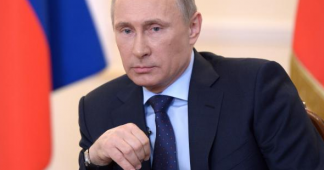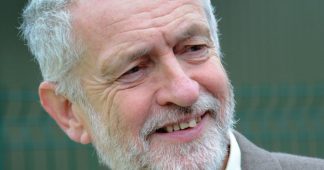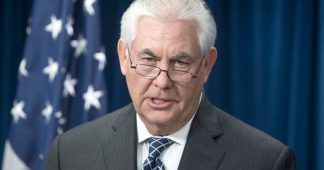Nobody of us can really know what happened in London with the Russian ex-double agent they tried to kill.
But Russians would be foolish to let the agent leave from Russia to try to assassinate him many years afterwards, at the eve of their Presidential Election.
DK
Anti-Russia campaign follows alleged poisoning of former UK/Russian double agent and daughter
By Robert Stevens
8 March 2018
The British government and mass media have mounted a hysterical anti-Russian campaign centred on the still unexplained circumstances surrounding the hospitalisation of former British double agent Sergei Skripal and his daughter, after they were found unconscious on a bench in Salisbury on Sunday.
Initial reports Monday stated that Skripal, aged 66, may have ingested fentanyl, a synthetic opioid many times stronger than heroin, which can be fatal in small doses.
On Tuesday, the other person hospitalised was identified as Skripal’s 33-year-old daughter, Yulia, who was also said to be in a critical condition.
Skripal is a former colonel in Russia’s GRU, the military intelligence service. He spent four years in jail in Russia after being found guilty in 2006 of passing secrets to MI6, the UK’s foreign intelligence service. He was sentenced to 13 years in prison.
Skripal served four years before being released in 2010, when he was pardoned by Russia as part of a well-publicized 10-person spy swap between the US, the UK and Russia. He moved to the UK where he has lived for the past seven years.
The pair were found unconscious and slumped on a bench near the Maltings shopping centre. Police stated that two became ill at around 13.30 p.m. Police arrived on the scene at around 16.15 p.m., after being alerted by a concerned member of the public. It was announced Wednesday that a police officer is also in critical condition after attending the incident. The Skripals visited a nearby restaurant, Zizzi’s, which was cordoned off, as well as a local pub, The Bishop’s Mill.
By Tuesday, despite nothing of substance being reported by the police, the government and media had effectively declared the incident an act of terrorism, with the finger pointing at Russia’s Putin government. References to an opioid being involved were dropped, with media reports saying the government’s secret chemical lab at Porton Down was as yet unable to identify the substance. Wiltshire police announced that London’s Metropolitan Police counter-terrorist unit would be taking over the investigation.
In parliament, Foreign Secretary Boris Johnson spoke about the “disturbing incident in Salisbury” and stated, “Although I am not now pointing fingers, because we cannot point fingers, I say to governments around the world that no attempt to take innocent life on UK soil will go either unsanctioned or unpunished,” He then referred to Russia as a “malign and destructive force” and warned that if Moscow were found to be involved, the government would “take whatever measures we deem necessary to protect the lives of the people in this country, our values and our freedoms.”
In another pointed reference to Russia, he stated that the case had “echoes of the death of Alexander Litvinenko in 2006”—the former officer in Russia’s Federal Security Service (FSB, the successor to the KGB), who died on November 23, 2006 after having been granted asylum in Britain in 2000. The UK, backed by the US have long claimed that the Putin regime ordered the killing despite no evidence being presented in an official British inquiry in 2016—other than the presence of the radioactive substance polonium.
Johnson threatened that England could consider boycotting the soccer World Cup in Russia this summer.
Every newspaper, apart from the Financial Times, led with hysterical anti-Russian headlines . The Sun blared, “Red Spy in UK Poison Terror,” with an accompanying story referring to “fear over a Kremlin backed hit…” The Daily Mirror’s headline was “ ‘Assassins’ on British street”.
In an article in the Spectator, columnist Ed West posed the question, “Will Britain stand up to Russia?”
By the evening, despite Newsnight anchor Kirsty Wark introducing the story by saying, “so far we know nothing about what happened to them, if they were poisoned and if they were, by whom,” the BBC’s flagship news programme was dedicated to a narrative that Russia was responsible and that Skripal and his daughter were likely victims of an attack by Russia intelligence operatives.
The media have reported the deaths of Skripal’s wife, his son and his older brother as mysterious events requiring investigation. His wife died of cancer in 2012 in Britain.
The following day the Daily Telegraph asserted that “Putin swore death on poisoned Russian spy.” The Times went with “MI5 believes Russians tried to kill former spy.”
On Wednesday morning, the government convened its COBRA committee, which meets during periods of national emergencies. On Wednesday evening, Met Police Assistant Commissioner Mark Rowley announced that Skripal and his daughter were subjected to an attack by a “nerve agent,” with it being classified as a case of “attempted murder.”
No information released by the authorities can be taken at face value. All reports attest that Skripal was supposedly politically inactive. He evidently did nothing to hide his identity, buying a house for £260,000 in his real name and applying to join a railway social club. He regularly bought lottery scratch cards and purchased food from a local Polish food store.
If the Putin regime were indeed set on killing Skripal and his daughter, some explanation needs to be made as to motive. Skripal’s daughter lived and worked in Russia and made regular trips back and forth.
At least one other person released from jail in Russia would appear to have been a much more likely target of the Putin regime than Skripal, if indeed its intention was to prevent anti-Russian activities. Igor Sutyagin developed into a prominent anti-Putin figure in the UK, becoming a fellow at the Royal United Services Institute (RUSI) defence and intelligence think-tank.
RUSI is central to the formulation of British imperialism’s anti-Russian policy. Even the Guardian’s main advocate against the Putin regime, columnist Luke Harding, was forced to acknowledge that Sutyagin “gave lectures on Vladimir Putin’s darkening state, and kept a high public profile. Skripal, by contrast, eschewed London. He settled with Liudmilla [his wife] in the comparative quiet of Wiltshire.”
Asking the question who would benefit from the deaths of Skripal and his daughter, there would appear to be no obvious reason why the Putin government would authorize such an act. Putin is currently campaigning in the last stretch of the 2018 presidential election, which takes place on March 18. He is expected to be re-elected.
Under conditions in which the NATO powers, including Britain, are seeking to utilise any pretext to justify their ongoing encirclement of Russia’s border, Putin authorising the murder of two people on the streets of the UK would be a propaganda gift to his opponents.
The response of the government and media to these events must be placed in the context of the concerted drive by London to demonize Russia. Only last week the Times devoted its front page, an op-ed piece and an editorial to bellicose calls by senior military figures, including second in command of the armed forces, Sir Gordon Messenger, for an increase in military spending, naming Russia as the power that must be confronted.
This followed a January speech given at RUSI by General Sir Nick Carter, the Chief of the General Staff of the British Armed Forces, in which he declared that the UK had to actively prepare for war with Russia and other geo-political rivals.











